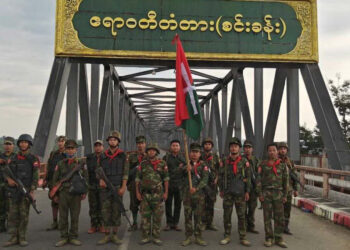CHIANG MAI, Thailand—The Karenni National Progressive Party (KNPP) raised the issue of the Myanmar military’s recent deployment of troops in areas under the party’s control in Karenni State with the government’s Peace Commission (PC) during informal talks in this northern Thai city on Monday.
The KNPP sees the deployments by the Myanmar military (or Tatmadaw) since late 2018 as being of concern not just to itself, but also to the security of the public.
The KNPP has held five rounds of informal talks with the government since last year. The talks are aimed at finding a path for the group to eventually sign the Nationwide Ceasefire Agreement (NCA).
KNPP vice chairman Khu Oo Reh headed the party’s delegation to the negotiations, which were led by PC secretary U Khin Zaw Oo.
KNPP spokesman Nei Neh Plo, who took part in the negotiations, said the KNPP discussed the situation on the ground, which has seen increased deployments of Tatmadaw troops in Karenni-controlled areas. Delegates also discussed ways of overcoming this obstacle to the KNPP’s joining the path to the NCA.
Only when the disputes on the ground are solved and mutual trust improves will the two sides be able to move forward with negotiations, Nei Neh Plo said.
“Many incidents in late 2017 and in 2018 hindered the KNPP from moving forward to [enter] bilateral negotiations on the NCA. For instance, the case of the murders of four Karenni soldiers [in December 2017] and clashes with Tatmadaw troops, after they failed to inform us in advance of their movements in our areas. Thus, negotiations were set back and didn’t advance,” he said.
He added that recent decisions by NCA signatories had slowed the progress of the KNPP’s efforts to join the NCA process. He cited the Karen National Union’s temporary suspension of its participation in the formal peace process in October, and the Restoration Council of Shan State’s decision to put off its participation in the mechanisms of the Joint Ceasefire Monitoring Committee.
“Thus for the KNPP, signing the NCA seems to getting more distant, even if we wanted to join,” Nei Neh Plo said.
The KNPP entered bilateral talks with the government after peace negotiations with the United Nationalities Federal Council’s Delegation for Political Negotiation ended in early 2018.
U Zaw Htay, the director general of the Myanmar State Counselor’s Office, told reporters on Monday after the informal talks that negotiations are ongoing to settle the problems on the ground in Karenni State, and to get the KNPP on the NCA path. He said the talks were a positive development.
“We still have to negotiate the date [for further talks] and how we move the process forward step by step. Our discussions were constructive and it was a good meeting. We hope the KNPP will sign the NCA soon, and we are moving forward based on that expectation,” he said.
















